
Vladimir Vladimirovich Putin is a Russian politician and former intelligence officer serving as the current president of Russia. Putin has served continuously as president or prime minister since 1999: as prime minister from 1999 to 2000 and from 2008 to 2012, and as president from 2000 to 2008 and since 2012.
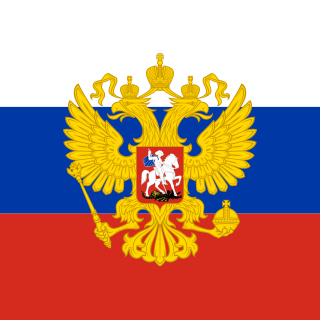
The president of the Russian Federation is the head of state of Russia. The president leads the executive branch of the federal government of Russia and is the commander-in-chief of the Russian Armed Forces. It is the highest office in Russia.

The Federal Security Service of the Russian Federation (FSB) RF; Russian: Федеральная служба безопасности Российской Федерации, tr.Federal'naya sluzhba bezopasnosti Rossiyskoy Federatsii, IPA: [fʲɪdʲɪˈralʲnəjə ˈsluʐbə bʲɪzɐˈpasnəstʲɪ rɐˈsʲijskəj fʲɪdʲɪˈratsɨɪ]) is the principal security service of Russia and the main successor agency to the Soviet Union's KGB; its immediate predecessor was the Federal Counterintelligence Service (FSK) which was reorganized into the FSB in 1995. The three major structural successor components of the former KGB that remain administratively independent of the FSB are the Foreign Intelligence Service (SVR), the Federal Protective Service (FSO), and the Main Directorate of Special Programs of the President of the Russian Federation (GUSP).

Colour revolution is a term used since around 2004 by worldwide media to describe various anti-regime protest movements and accompanying changes of government that took place in post-Soviet Eurasia during the early 21st century—namely countries of the former Soviet Union, and the former Yugoslavia. The term has also been more widely applied to several other revolutions elsewhere, including in the Middle East, the Asia-Pacific region, and South America, dating from the late 1980s to the 2020s. Some observers have called the events a revolutionary wave, the origins of which can be traced back to the 1986 People Power Revolution in the Philippines.

Dmitry Nikolayevich Kozak is a Russian politician who has served as the Deputy Kremlin Chief of Staff since 24 January 2020. He previously served as the Deputy Prime Minister of Russia from 2008 to 2020.
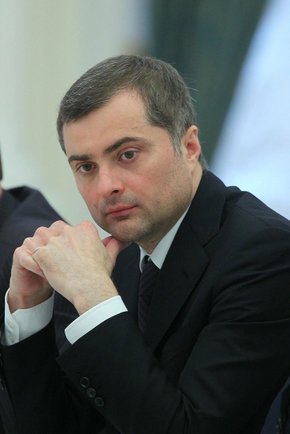
Vladislav Yuryevich Surkov is a Russian politician and businessman. He was First Deputy Chief of the Russian Presidential Administration from 1999 to 2011, during which time he was often viewed as the main ideologist of the Kremlin who proposed and implemented the concept of sovereign democracy in Russia. From December 2011 until May 2013, Surkov served as the Russian Federation's Deputy Prime Minister. After his resignation, Surkov returned to the Presidential Executive Office and became a personal adviser of Vladimir Putin on relationships with Abkhazia, South Ossetia and Ukraine. He was removed from this duty by presidential order in February 2020.

The Collective Security Treaty Organization (CSTO) is an intergovernmental military alliance in Eurasia consisting of six post-Soviet states: Armenia, Belarus, Kazakhstan, Kyrgyzstan, Russia, and Tajikistan. The Collective Security Treaty has its origins in the Soviet Armed Forces, which was replaced in 1992 by the United Armed Forces of the Commonwealth of Independent States, and was then itself replaced by the successor armed forces of the respective independent states.
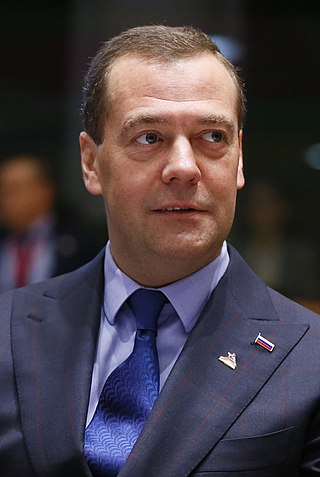
Dmitry Anatolyevich Medvedev is a Russian politician who has been serving as the deputy chairman of the Security Council of Russia since 2020. Medvedev also served as the president of Russia between 2008 and 2012 and prime minister of Russia between 2012 and 2020.

There are no diplomatic or bilateral relations between Ukraine and Russia. The two countries have been in a state of war since 24 February 2022. Following the Ukrainian Revolution of Dignity in 2014, Ukraine's Crimean Peninsula was occupied by unmarked Russian forces, and later annexed by Russia, while pro-Russia separatists simultaneously engaged the Ukrainian military in an armed conflict for control over eastern Ukraine; these events marked the beginning of the Russo-Ukrainian War. In a major escalation of the conflict on 24 February 2022, Russia launched a full-scale invasion of the Ukrainian mainland across a broad front, causing Ukraine to sever all formal diplomatic ties with Russia.
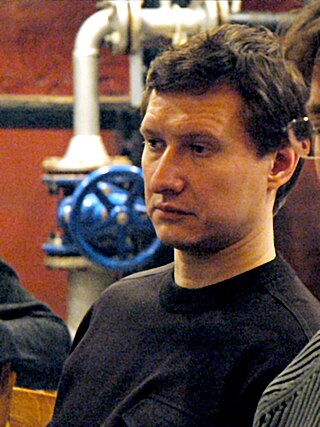
Stanislav Yuryevich Markelov was a Russian human rights lawyer. He participated in a number of publicized cases, including those of left-wing political activists and antifascists persecuted since the 1990s, as well as journalists and victims of police violence.
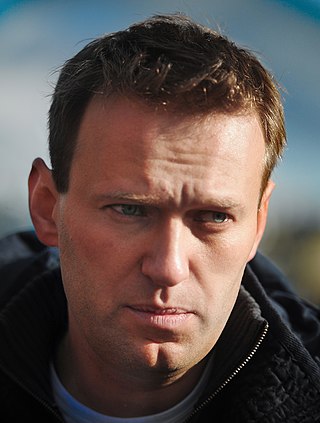
Alexei Anatolievich Navalny is a Russian opposition leader, lawyer, and anti-corruption activist. He has organised anti-government demonstrations and run for office to advocate reforms against corruption in Russia, and against president Vladimir Putin and his government, who avoids referring directly to Navalny by name. Navalny was a Russian Opposition Coordination Council member. He is the leader of the Russia of the Future party and founder of the Anti-Corruption Foundation (FBK). He is recognised by Amnesty International as a prisoner of conscience, and was awarded the Sakharov Prize for his work on human rights.

Valery Vasilyevich Gerasimov is a Russian army general serving as the Chief of the General Staff of the Russian Armed Forces and First Deputy Minister of Defence.

The Russo-Ukrainian War is an ongoing international conflict between Russia, with Russian-controlled separatists, against Ukraine, which began in February 2014. Following Ukraine's Revolution of Dignity, Russia annexed Crimea from Ukraine and supported pro-Russian separatists fighting the Ukrainian military in the Donbas War. The first eight years of conflict also included naval incidents, cyberwarfare, and heightened political tensions. In February 2022, the conflict saw a major escalation as Russia launched a full-scale invasion of Ukraine.

The Donetsk People's Republic is an unrecognised republic of Russia in the occupied parts of eastern Ukraine's Donetsk Oblast, with its capital in Donetsk. The DPR was created by militarily-armed Russian-backed separatists in 2014, and it initially operated as a breakaway state until it was annexed by Russia in 2022.

The Luhansk People's Republic or Lugansk People's Republic is an unrecognised republic of Russia in the occupied parts of eastern Ukraine's Luhansk Oblast, with its capital in Luhansk. The LPR was created by militarily-armed Russian-backed separatists in 2014, and it initially operated as a breakaway state until it was annexed by Russia in 2022.

The Minsk agreements were a series of international agreements which sought to end the Donbas war fought between armed Russian separatist groups and Armed Forces of Ukraine, with Russian regular forces playing a central part. The first, known as the Minsk Protocol, was drafted in 2014 by the Trilateral Contact Group on Ukraine, consisting of Ukraine, Russia, and the Organization for Security and Co-operation in Europe (OSCE), with mediation by the leaders of France and Germany in the so-called Normandy Format. After extensive talks in Minsk, Belarus, the agreement was signed on 5 September 2014 by representatives of the Trilateral Contact Group and, without recognition of their status, by the then-leaders of the self-proclaimed Donetsk People's Republic (DPR) and Luhansk People's Republic (LPR). This agreement followed multiple previous attempts to stop the fighting in the region and aimed to implement an immediate ceasefire.

Leonid Ivanovich Pasechnik is a politician from the Donbas region, who serves as Head of the Lugansk People's Republic (LPR) since 2017. He holds the position in acting capacity ever since the Russian annexation of the LPR in 2022. Pasechnik had previously held office as the LPR's Minister of State Security from 2014 to 2018.

In March and April 2021, the Russian Armed Forces began massing thousands of personnel and military equipment near Russia's border with Ukraine and in Crimea, representing the largest mobilization since the illegal annexation of Crimea in 2014. This precipitated an international crisis due to concerns over a potential invasion. Satellite imagery showed movements of armour, missiles, and heavy weaponry. The troops were partially withdrawn by June 2021, though the infrastructure was left in place. A second build-up began in October 2021, this time with more soldiers and with deployments on new fronts; by December over 100,000 Russian troops were massed around Ukraine on three sides, including Belarus from the north and Crimea from the south. Despite the Russian military build-ups, Russian officials from November 2021 to 20 February 2022 repeatedly denied that Russia had plans to invade Ukraine.
Many states, international organizations, and civil society actors worldwide had expressed their reactions to the then-escalating crisis between Russia and Ukraine that started in March 2021. The crisis eventually culminated in a Russian invasion of Ukraine, beginning on 24 February 2022.
"On the Historical Unity of Russians and Ukrainians" is an essay by Russian president Vladimir Putin published on 12 July 2021.



















